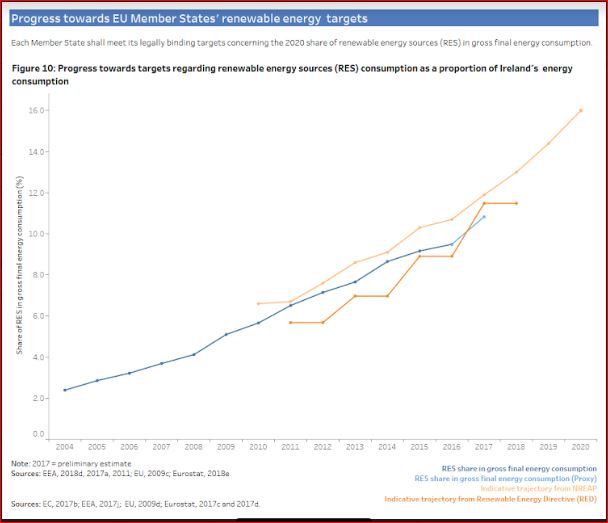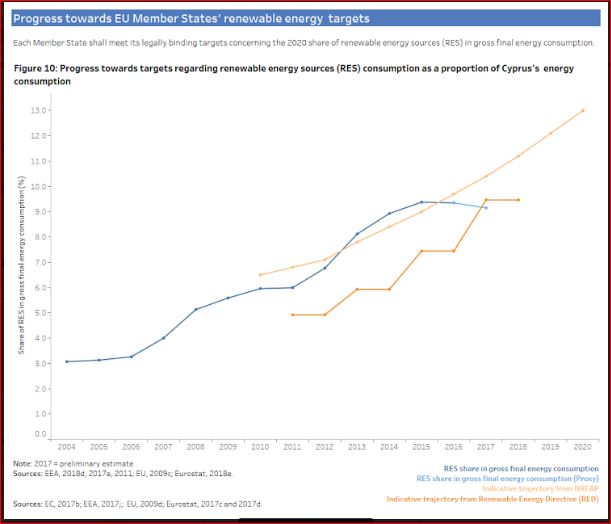by Pat Swords
Scare mongering about fines seems to be all the fashion these days. However, let's face it, the fact that the renewable programme was so dysfunctional that they couldn't get it to work was really their fault, if they had done an SEA and Regulatory Impact Analysis, as they were legally required, they would have found out before they started that it wasn't going to work.
However, there is another angle to that, namely Article 4(4) of the Directive:
- 4. A Member State whose share of energy from renewable sources fell below the indicative trajectory in the immediately preceding two-year period set out in part B of Annex I, shall submit an amended national renewable energy action plan to the Commission by 30 June of the following year, setting out adequate and proportionate measures to rejoin, within a reasonable timetable, the indicative trajectory in part B of Annex I.
- The Commission may, if the Member State has not met the indicative trajectory by a limited margin, and taking due account of the current and future measures taken by the Member State, adopt a decision to release the Member State from the obligation to submit an amended national renewable energy action plan.
I was pointing this out in my recent correspondence to UNECE, Ireland has fallen way behind its NREAP trajectory, so has the Netherlands.
The European Environment Agency has just recently updated its webpage with an analysis for each Member State based on 2017 data - click on a country and then scroll the tab until you get to Progress on Renewable Energy:
So Ireland in 2017 was 10.8% (they squeezed a bit more!) but versus 11.9% in NREAP Trajectory. In 2016 it was 9.5% versus 10.7%. Bottom line, they should be doing a new NREAP with proper SEA, etc., as the graph below shows they have been below the target now for several years and not getting any nearer to catching up with it. So where is that legally required new NREAP? There is no point in threatening us the public with fines, when the reason they are in a mess is a failure to properly comply with the law and come up with something, which wasn't so dysfunctional.
The Netherlands are doing even worse than Ireland :
France's situation is deteriorating also :
Luxembourg hasn't a hope of catching up :
Malta's gap just got huge :
Cyprus is actually going downhill, must have been some dodgy previous reporting there :
Slovenia is also going downhill :
The sensible Poles just don't seemed to be bothered about this silly renewable programme anymore :









Who set the targets? The intention of setting targets was never part of any parties general election manifesto. Ireland now has twice the electrical generation capacity is needs, how is that going to cut co2? Since when did the Irish people opt to become world leaders in cutting co2 or anything else for that matter?
ReplyDeleteThe minister's government cannot build homes for thousands of homeless citizens. The National Pension Reserve Fund is gone, the office was closed down and the staff transferred. Billions of citizens money gone mainly on bank bailouts, wind farms and green hoax projects. The average annual losses of his darling wind farms is an average of 66,000 euros per MW, or 1.9 billion euros per year, 5.7 billion in the last 3 years in a country with 4 million of a population.
His government cannot run a police force, a health service and has given the people government by judicial tribunal. Gangland crime is at epidemic levels.
The Minister should more forth coming about the loss making situation in relation to wind energy investments by state companies reporting to his department. Older wind farms like Gort Wind Farm are having to make significant asset write-offs (€9.739m m in 2017). Which resulted in a "(Loss) for the financial year "of €10.236m. Garvagh Glebe is another wind farm that does not seem to be in any better a financial. The wind turbines used on that site have been decommissioned in Denmark. A big asset write off is likely for this wind farm as well.All other 7 to 8 year old wind farms in Ireland must be in a similar financial position having to make large write down in their asset valuations.Therefore likely losses in the future will be significantly higher than those outlined by Val above.Had the politicians just got the published Danish Wind Turbine Data. It would have been pretty obvious from not too detailed an analysis that the renewable energy policy based on wind turbine generation would fail. They are now using pension money set aside for Irish pensioners to prevent their wind energy program imploding financially. It is their problem let them take the hit not the taxpayers . Wind farm survival seems to be more important to them( politicians) than the survival of homeless people having to sleep rough.
ReplyDeleteSurely the Minister meant to say that it is costly both economically and environmentally for Ireland in being a leader in Climate (Change). And surely it is a thing of good fortune that in the last 5yrs as Ireland moves increasingly further away from ever reaching the EU EED 2020 targets that the fines estimate from the department have considerably gone down compared to the earlier fine estimates. Former Minister Denis Naughton about a year ago said that certificates would be purchased at a much lower cost than the fines in order to offset the actual EU EED fines. So when Minister Richard Bruton is talking about the cost of fines is he talking about the cost to offset them or the cost of paying the actual fines? Either way given the potential massive per annum costs socioeconomically and environmentally of continuing the further expansion of the failed intermittent renewable energy project/experiment and the utter nonsense of installing attempted sticking plaster projects such as the currently proposed 3000+ megawatts of Industrial Lithium Ion Battery Energy Storage Systems BESS's it would clearly make more sense to quit the pointless scaremongering and to simply pay to offset the fines and/or do what Pat Swords suggests above.
ReplyDeleteWhy pay both the fines and continue to pay even more to continue an extremely costly renewable energy programme that has clearly failed?
When will the Minister and more to the point his department realise that Ireland will never ever reach any of the EU EED 2020, 2030 or 2050 targets for as long as Ireland continues to host more than its fair share globally of fossil fuel guzzling Data Centres many connected to the national electricity supply grid having negotiated highly subsidised rates of electricity per kWh? Why should Ireland subsidise the energy infrastructure required to support Data Centres and subsidise the electricity required to power them and then have to pay the related per annum emission fines for Europe largely to store its selfies and data rubbish in Ireland?
Cape Norris Jessup is the only weather station I can find that publishes raw temperature data on an hourly basis. It is also the nearest one to the North Pole. Go into the 6th December 2005, scroll up follow the temperature until 9 pm it was -28.1 degree C for the last week. Within 3 hours it drops to 59.8 degrees C. 59.8 is a default temperature, it is used as an estimate when the station is not recording properly. It should be excluded when assessing historical data. I tried to provide a link without success, here it is agian.. https://rp5.ru/Weather_archive_in_Cape_Morris_Jesup
ReplyDeleteA comparison for 2005 temperature and 2018 temperature shows it is nearly 8 degrees Centigrade colder now than in 2005.
Two matters of interest:
ReplyDeleteThere is no data published for Cape Norris Jessup for December prior to 2009. This may be because of the difficulty f collecting data in such an extreme location in winter. The earliest data is from 2009. Average temperature was minus 7.5 degrees, to day it is minus 22 degrees "C", It is 14.5 degrees colder today than the same day 9 years ago.
Second is the Paris Yellow jacket protest. The core cause is poverty inflicted by government but the last straw was a 23 cent rise in the price of fuel. The government caved in. There was surprise at the ferocity of the protest which took lives. This blog has long tried to point out the massive cost to ordinary people of the current climate taxation with accompanying renewable energy extravaganza. What will France do now? One thing is for sure, the Irish government would like to point to France as an example to justify its own taxes. Not now, our government wants Ireland to be best boy in the class. We soon will be, because everyone else will be gone home.